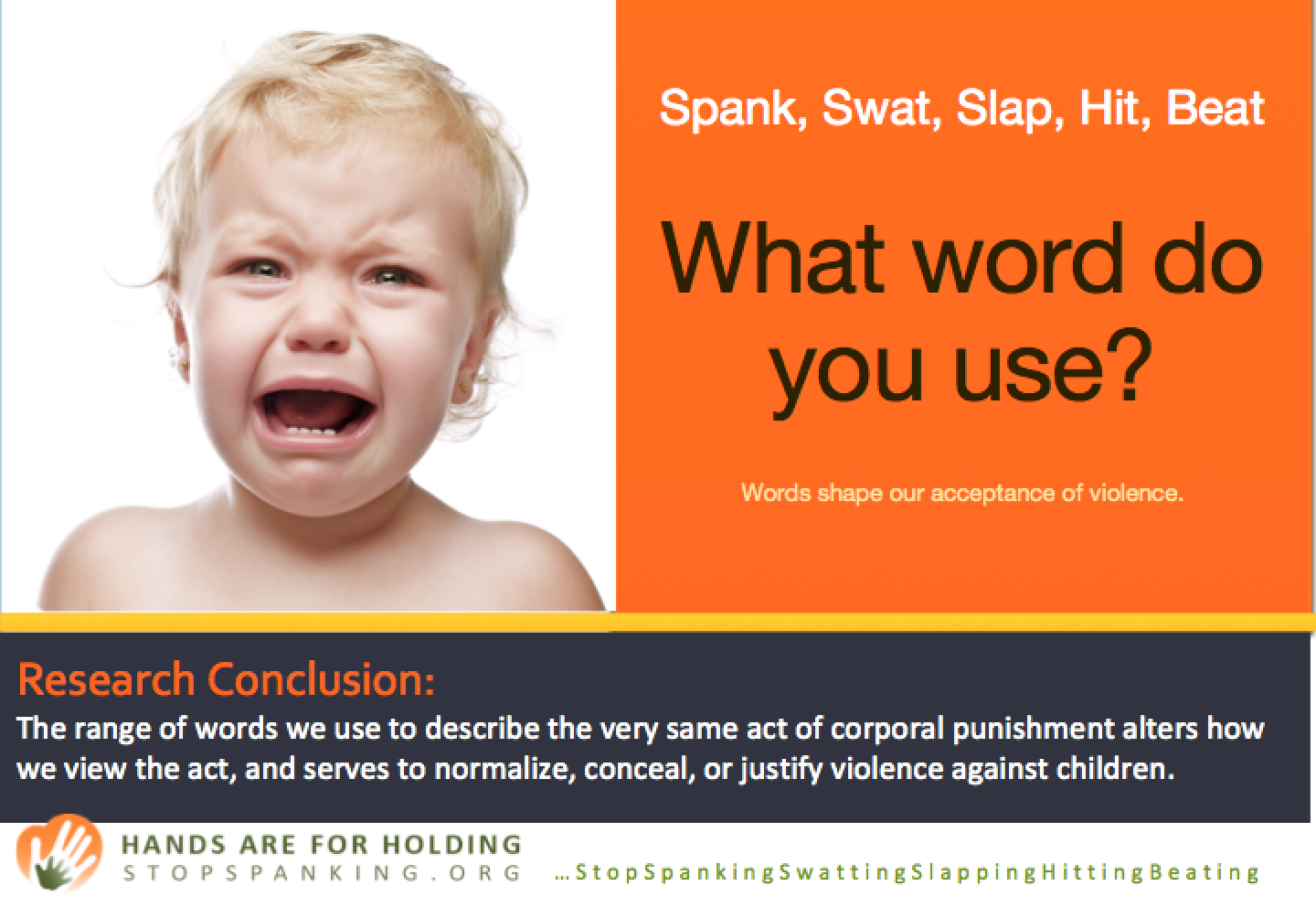Hitting or Spanking – What’s the Diff?
 Objectifying people and using euphemisms that minimize their needs and suffering can be harmful. But clearly euphemisms serve a purpose. It has long been understood that using euphemisms can help a soldier perform acts of torture on the perceived enemy, without being overcome by his own reactivity. Euphemisms inhibit the emotional response associated with the violent act, preventing the soldier from directly experiencing the pain he is inflicting. His innate empathic connection to the other person is severed. “If I can’t feel you, I can hurt you,” is the idea.
Objectifying people and using euphemisms that minimize their needs and suffering can be harmful. But clearly euphemisms serve a purpose. It has long been understood that using euphemisms can help a soldier perform acts of torture on the perceived enemy, without being overcome by his own reactivity. Euphemisms inhibit the emotional response associated with the violent act, preventing the soldier from directly experiencing the pain he is inflicting. His innate empathic connection to the other person is severed. “If I can’t feel you, I can hurt you,” is the idea.
This very same phenomena occurs with children, where we minimize their pain and condone violence, irrespective of the very real and actual harm being done to them. Rather than hitting them, we spank them.
Case in point. Do you remember Adrian Peterson’s son? Clearly Peterson assaulted his 4-year-old son with a tree switch, evidenced by lacerations on his bottom, legs, and scrotum. There were a variety of words used to describe this incident, and it is those words that carried with it a perception of how much harm was actually caused to the child. Research helps us understand that it is not only the act itself that informs us of the degree of harm, but the words we use to describe that act. Although the word spank, swat, hit, slap, and beat may be functionally indistinguishable in the media’s descriptions of the Adrian Peterson case, each term evoked different interpretations of the associated parental behavior.
Here are the highlights:
• When spanking is viewed as common, people are more likely to view it as acceptable and effective.
If something is common, we have a tendency to think it is also OK.
• People view spanking as common.
People did not view other words that describe the very same act such as swat, slap, hit, beat as common.
• Research has already found that language contributes to the mistreatment, abuse, and denial of children’s rights
George Holden, PhD, found that because the word spank is seen as a common, acceptable, and effective, its use has an effect of sanitizing or normalizing harsh punishment. The words we use influence how we perceive an act.
Consider an interesting piece of corollary research that studied the power of words to alter perception of the same event. This study compared synonyms to explore how singular word labels alter memory of the severity of a witnessed experience. After viewing a slide show depicting an automobile accident, participants were given one of five verbs (“collided,” “bumped,” “hit,” “contacted,” or “smashed”) to describe the accident. Subsequent estimates of vehicle speed prior to the accident were influenced by the verb used (i.e., “hit” ! 34 mph, “smashed” ! 41 mph). In addition, more severe verbs increased the percentage of participants who later claimed to have seen broken glass on the road (“hit” ! 7%; “smashed” ! 16%) even though none appeared in the accident scene.
Society condemns hitting children, but not when we call it something else. When we recognize intellectually and viscerally what spanking actually is, we are alarmed. Spanking is physical violence. The word spanking serves to inhibit the distress most parents would otherwise feel in response to striking their own child. Let’s start calling spanking what it is. Because one thing is for sure, “If I can feel you, I can’t hurt you.”
Research:
Spank, Slap, or Hit? How Labels Alter Perceptions of Child Discipline.
Brown, Alan S.; Holden, George W.; Ashraf, Rose, Psychology of Violence

Kayla
Being spanked traumatized me and my sister. It was terrifying. I screamed and sobbed and she would lock me, twist my body downwards, shove my face to the floor and hit me as hard as she could. The terror and agony and betrayal as she continued to beat her frustrations out on me never left me. As adults, I now know my mother always loved me and did the best she could as a single mother. She had her own issues with addiction, divorce, and body image. Now, we have a very good relationship. But as a teen, before all the years of therapy and carefully salvaging our bond through repeated trial-and-error, I hated her intensely. I hated her and thought about killing her. Unfortunately one thing that spanking gave me, is the ability to cut off all empathy for someone. I have a big heart but I become cold and sadistic when I think about people who spank their children. I want these parents to be beaten, to know that powerlessness over and over, and want them to be powerless and feel my pain. They can’t feel my pain, they can’t feel their children’s pain, and in my fury I lose all empathy for their pain and only want them to suffer more. I understand this is wrong, because this world needs more empathy, NOT LESS. Revenge doesn’t make it right. Victimizing others because you were a victim only creates more victims. However, I can’t change the visceral hate, the blinding coldness I feel when provoked. I can’t stand people who say spanking is okay, I hate people with no empathy, which is a feeling I recognise as displaying a lack of empathy for the misguided ignorant people I hate!